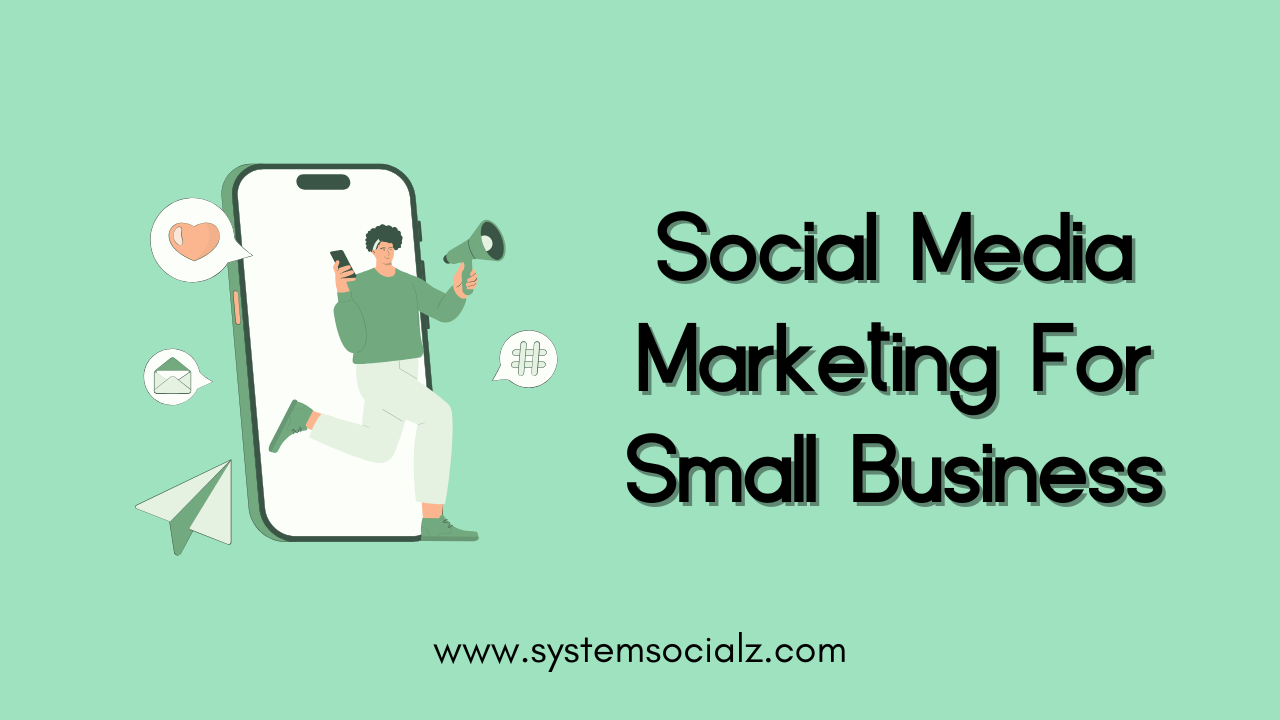In our digital era, social media has become a crucial asset for businesses, no matter their size. For small businesses looking to make their mark in 2025, a robust social media marketing strategy is more crucial than ever. With platforms constantly evolving and consumer behaviors shifting, it can be challenging to navigate the complex world of social media. That’s where SystemSocialZ comes in.
Our guide, “Social Media Marketing For Small Business 2025: Tips And Strategies For Success,” is designed to equip you with the knowledge and tools you need to thrive in this dynamic landscape. We’ll delve into the latest trends, best practices, and actionable insights to help you create engaging content, build a loyal following, and ultimately drive growth for your business.
What Is Social Media Marketing?
Social media marketing refers to the strategy of promoting a business and its offerings on major social media platforms such as Facebook, Instagram, TikTok, LinkedIn, YouTubeand more.
This type of marketing includes producing and sharing engaging content, interacting with your audience by replying to comments and messages, and utilizing paid social media advertising campaigns.
The goal of social media marketing is to boost brand visibility, connect with your audience, and drive sales, making it a vital component of any business’s digital marketing approach.
For instance, outdoor apparel brand Topo Designs effectively markets its products on Instagram. They highlight new releases like packs, boots, and fleeces while encouraging purchases by including a call to action (CTA) that directs followers to shop through a link in their Instagram bio.

Soure: topodesigns
Benefits of Social Media Marketing for Small Enterprises
Social media marketing for small businesses is an incredibly effective tool for growth, regardless of the company’s size.
Why is it so valuable?
Because it provides a cost-efficient way to raise brand awareness at the top of the marketing funnel, allowing small businesses to reach new potential customers, introduce them to their products or services, and guide them toward making a purchase over time.
Some key advantages of social media marketing for small businesses include:
- Competing with established, larger businesses for audience attention.
- Gaining new leads and customers by directing traffic to your website.
- Creating buzz around upcoming events, product launches, or sales.
- Gaining insights into customer preferences and interests.
- Delivering personalized content that boosts engagement and drives results.
- Sharing industry expertise to position your business as a thought leader.
- Building and maintaining strong, long-term relationships with customers.
- Offering fast and accessible customer service solutions.
Crafting a Winning Social Media Marketing for Small Businesses for 2025
Research Your Competitors
Identifying your competitors is a key step in developing social media marketing for small businesses. You need to know which companies you’re competing with for audience attention and engagement.
Once you gather this information, you can tailor your social media content strategy accordingly.
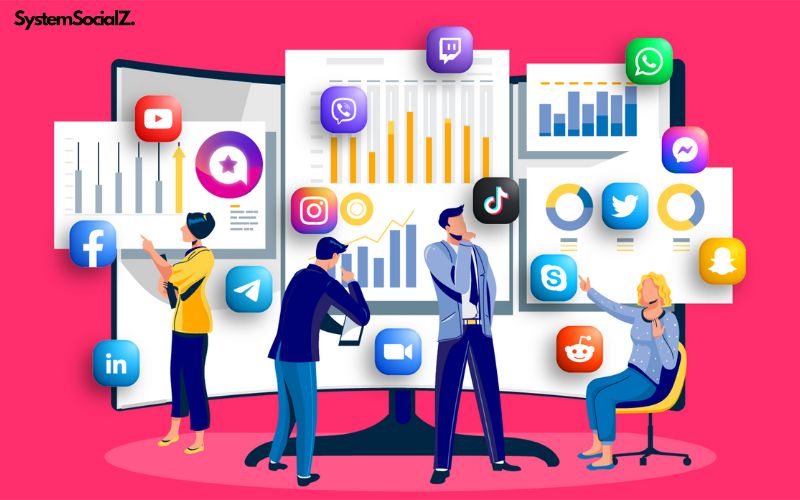
How is Social Media Marketing understood?
Begin by identifying both direct and indirect competitors:
Direct competitors offer similar products or services, target the same audience, and compete for market share.
Indirect competitors provide different products or services but still target the same audience and may compete for attention in your industry.
For instance, if you run a burger restaurant, your direct competitors could be Five Guys, Shake Shack, or Wendy’s. Indirect competitors, like Chipotle or Taco Bell, offer different food (e.g., Mexican cuisine) but appeal to the same fast-food audience.
By analyzing your competitors, you can set benchmarks to evaluate how your small business’s social media marketing measures up against others.
Set Social Media Goals and Objectives
Utilize the SMART goal framework to define objectives that are clear, quantifiable, attainable, pertinent, and time-sensitive. This approach helps ensure that your social media marketing for small business is both focused and efficient, while also allowing you to track campaign performance effectively.
For small businesses just starting out with social media marketing, the SMART goals they set will likely differ from those of larger, more established companies due to variations in team size, resources, and budget.
For example, if you’ve just launched a new burger restaurant, you might set a SMART goal like “increase organic Instagram engagement by 15% over the next quarter” or “boost website traffic from Facebook by 5% within the next two weeks.
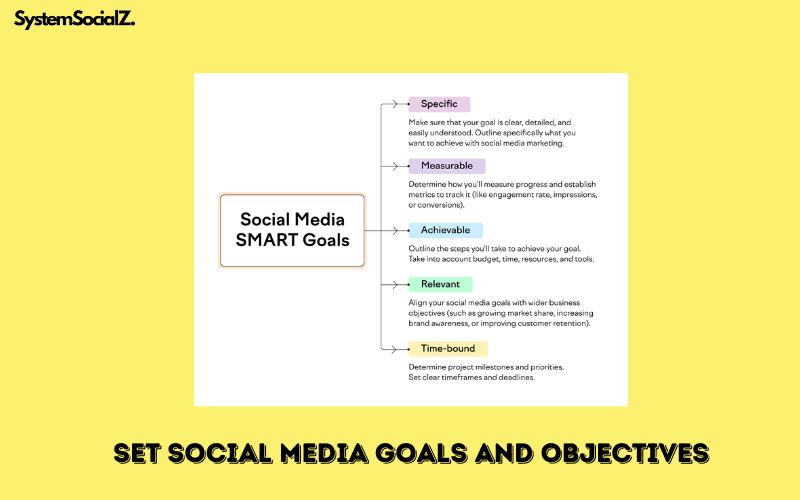
Social Media Marketing for Small Business Don’t Forget SMART
Get to Know Your Target Audience
A target audience is a specific group of people you want to reach with your social media marketing efforts. This group is typically defined by characteristics such as age, gender, income, interests, behaviors, and goals.
Identifying your target audience is crucial for creating effective campaigns that resonate and drive engagement, ultimately leading to faster and better results.
Where’s the best place to start researching your target audience?
Look at your competitors.
Since the target audience for their products is likely similar to yours, you can use insights about their audience to help define your own—an approach commonly used by social media marketing companies for small businesses.
Choose the Right Social Media Platforms for Your Business for 2025
Once you’ve identified your target audience, the next step is determining which social media platforms to prioritize. As an example, “We post on Facebook, Pinterest, and occasionally Twitter, but we focus primarily on Instagram and TikTok because that’s where our demographic is most active,” explains Safari.
For more details on selecting the best platforms for your audience, you can refer to this guide on managing social media.
Let’s take a look at the most popular social media platforms at a glance. For a deeper look into social media demographics, explore these 53 statistics—an essential resource for effective social media marketing for small business.
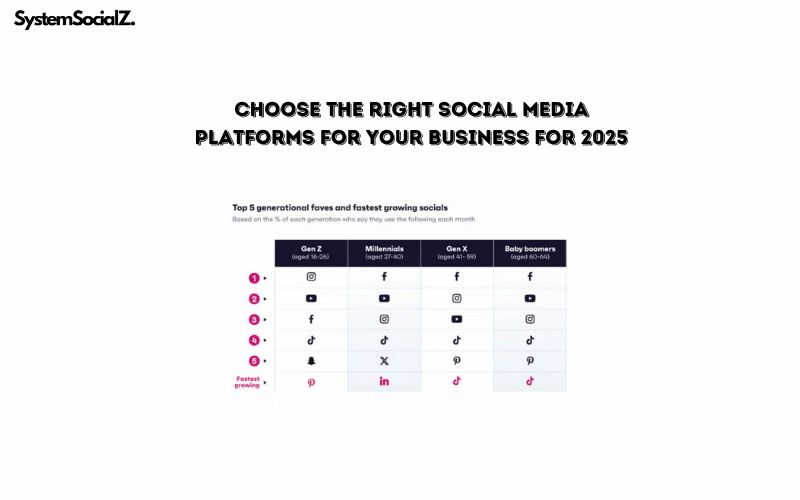 Source: GWI
Source: GWI
Instagram’s user base leans younger, making it the go-to platform for people aged 16 to 26. If your target audience consists of baby boomers, you might want to consider focusing on other platforms.
As a highly visual app, Instagram’s content revolves around photos and videos, with an algorithm (we’ll share the secret!) that prioritizes engaging content.
Instagram is particularly beneficial for social media marketing for small businesses because:
It offers in-app shopping, allowing users to purchase directly from posts, Reels, and Stories.
Its visual nature makes it perfect for industries like fashion, beauty, travel, and food.
Instagram users are highly engaged—every minute, 694,000 Reels are shared via direct messages.
Tiktok
Nearly 30% of TikTok users access the app daily, making it an excellent platform to promote your small business—especially if your target audience is younger. Over 40% of TikTok’s user base is under 24 years old.
TikTok is ideal for social media marketing for small businesses because:
It offers a level playing field—you don’t need a massive budget to create engaging, high-quality content.
Creativity is key. If you can think outside the box and be inventive, you’ll thrive on TikTok.
There’s great potential for virality. If your content resonates, it could be viewed by millions of users.
Facebook remains the most popular social media platform worldwide, with over 3 billion active users each month and more than 200 million businesses on the platform. Millennials account for 31% of Facebook’s audience, making it a great choice if they are your target demographic. The user base is 56% male, and while fewer teenagers use Facebook compared to a decade ago, it’s still a powerful platform.
Facebook is ideal for affordable social media marketing for small business because:
It offers a broad demographic range, reaching users across various age groups, genders, and interests.
It’s versatile. You can create a business page, run ads across Meta’s platforms, access audience insights, and even set up an e-commerce shop, all in one place.
It can serve as a comprehensive solution, supporting the entire customer journey from initial contact to final purchase.
X (Twitter)
With 250 million daily visitors, Twitter is a popular platform, but it has the largest gender gap among social media networks—60.9% male and 39.1% female. This is important to consider when assessing your target audience for social media marketing for small businesses.
Twitter is an excellent platform for small businesses because:
It fosters conversation, allowing you to engage directly with customers or even other businesses.
It operates in real-time, making it the go-to place for people seeking the latest updates, which is why news outlets and journalists are so active on Twitter.
It’s hashtag-friendly, making it easy to get your content in front of audiences interested in your niche through relevant hashtags.
LinkedIn is a social media platform designed specifically for professionals. Users turn to it for job hunting, hiring employees, networking, and seeking inspiration. The majority of LinkedIn’s web traffic comes from the U.S., making it an ideal choice if your target audience includes American professionals.
LinkedIn is a great platform for social media marketing for small businesses because:
It helps you connect with other businesses, serving as a powerful networking tool to build relationships within your industry or community.
It offers a professional atmosphere. Unlike platforms like TikTok or Instagram, LinkedIn content leans more toward serious, professional topics, making it perfect for businesses looking to maintain a formal image.
It’s a platform for hiring. A strong LinkedIn presence makes it easier for potential employees to find you and learn about your brand.
Pinterest users not only enjoy discovering and saving new ideas, but they’re also increasingly turning to the platform for making purchasing decisions—75% of users report that they are “always shopping.” The majority of Pinterest’s audience is between 25 and 34 years old.
Pinterest is an excellent platform for social media marketing for small businesses because:
It offers a positive environment, with 8 out of 10 users saying that Pinterest makes them feel good. Being active on such a platform can enhance your brand’s image and reputation.
It’s highly visual, which matters because 90% of information processed by the brain is visual. Pinterest allows you to showcase appealing images of your products or services.
You can tap into new audiences, as Pinterest functions as a visual search engine, giving your business the opportunity to be discovered by users actively searching for products or services like yours.
YouTube
YouTube is the leading platform for video content, making it a powerful tool for social media marketing for small businesses. If your business can produce engaging and informative videos, YouTube offers access to a massive audience eager for new content. It’s ideal for sharing tutorials, product demonstrations, vlogs, and behind-the-scenes looks at your business.
Additionally, YouTube provides the opportunity to monetize your channel through ads and sponsorships, creating an extra revenue stream for your small business.
Threads
Threads is a new social media platform developed by Meta, the company behind Facebook and Instagram, and it aims to compete with X. It allows users to log in via their Instagram accounts but focuses more on text-based content, allowing posts up to 500 characters. Users can also include links, photos, and videos up to five minutes long. For social media marketing for small businesses, Threads offers seamless integration with Instagram, making it easy to share content across both platforms and expand your reach.
Develop a Social Media Content Strategy for Your Business

Diverse content helps social media attract more customers
A social media content strategy is a comprehensive plan that outlines how you will create, publish, and manage content across your social media channels, making it crucial for effective social media marketing for small business.
Having a strategy provides direction for your content, putting you in a better position to achieve your marketing goals. This approach is much more effective than posting content impulsively, which can lead to stress, confusion, and wasted time.
Begin by listing the platforms you intend to focus on and the content formats available on each channel.
For instance, a list for Facebook could include:
- Text posts
- Images
- Videos
- Carousels
- Stories
- Live video
- Interactive content (e.g., polls, surveys, and quizzes)
Next, think about the various types of social media content you could create to engage your audience. If you’re having trouble coming up with creative ideas, consider using an AI Social Content Generator. This tool allows you to input details about your business and quickly generate on-brand content for your social media channels. This kind of efficiency is invaluable for small businesses starting their journey in social media marketing.
Once you determine what kind of content you want to share, decide how often you plan to post on each platform to maintain a consistent presence.
Regularly Engage with Your Audience
Foster success through engagement in social media marketing for small business
To set yourself up for success in social media marketing for small business, dedicate time to engage with your followers.
Regular conversations help cultivate lasting relationships with your audience, which are vital for achieving long-term business objectives. Actively engaging with your audience demonstrates your commitment to these relationships and shows that you value their interactions with your brand.
Responding to comments, whether positive or negative, is also crucial for managing your brand’s reputation and shaping how people perceive your company online.
To ensure you don’t miss any chances to interact with your followers, consider using a Social Inbox tool to gather comments, direct messages, and mentions from all your linked accounts. This allows you to respond directly within the interface, streamlining your engagement process.
Plan a Social Media Advertising Campaign
Social media marketing for small business enables you to pay for the distribution of digital advertising campaigns, targeting specific audiences across various social channels.
This approach allows small business owners to extend their reach and connect with individuals who may not yet be familiar with their brand, while also tailoring ads to specific demographics to enhance engagement potential.
In contrast to traditional advertising methods, such as television, print, or radio, social media advertising offers a budget-friendly solution for scaling a business, making it particularly suitable for smaller companies operating on limited budgets.
One effective method is to utilize native advertising, where you pay for a standard social media post to appear in the feeds of other users. You can identify these native ads by the “Sponsored” label in the top-right corner.
Social media ads typically operate on a pay-per-click (PPC) model, meaning you only incur costs when someone clicks on your ad.
Most social media platforms allow for precise targeting of ad content, making it easy to present your business to potential customers and drive revenue growth.

Plan your advertising to attract users.
Monitor and Measure Your Results
To enhance your social media marketing for small business, it’s crucial to monitor your performance consistently. This practice will provide insights into what elements of your strategy are effective and which are not, allowing you to refine your future content based on these insights.
Begin by assessing the level of engagement your social media posts generate. High engagement levels indicate that your content is resonating well with your audience.
Furthermore, an engaged audience is more likely to form an emotional connection with your business and ultimately convert into customers.
Utilize Social Analytics tools to evaluate your social media marketing performance across various platforms, ensuring you stay informed and can make data-driven improvements.
Listen to feedback
Engage with your audience for effective social media marketing for small business. You’ve successfully created engaging content—great job! Now that your audience is responding positively, it’s time to reciprocate their engagement.
Take notice of the comments, direct messages, and overall feedback your content receives. Make sure to respond to comments and messages, using audience input to guide your future posts. This brings us to.
Find Trend
This advice applies to both content and the platforms you choose. Research indicates that many small businesses are beginning to explore live audio chat rooms and short-form videos, two of the most significant trends of the past couple of years. However, adopting a new platform requires more effort than merely trying a different content format.
For a time, brands were hesitant about TikTok, perceiving it as a lighthearted platform primarily for entertaining Gen-Z users. Now, brands recognize it as a valuable network that can expand their reach and enhance brand awareness. This highlights that you don’t need to jump on every trend as soon as it emerges; instead, focus on monitoring these trends and how they evolve. While some may fade away, others can become essential components of your social media marketing strategy.
Essential Tools for Social Media Marketing for Small Business
Google Analytics for Tracking Metrics
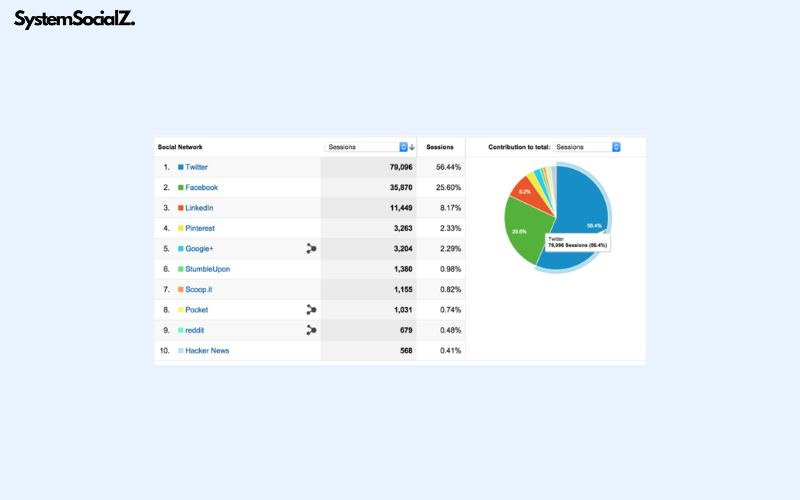 Sourre: Buffer
Sourre: Buffer
When asked about the tools they utilize for monitoring social media metrics, 75% of small businesses reported using Google Analytics. This platform enables you to assess the impact of your social media accounts on website traffic, specifically by tracking:
- The number of visitors arriving from social media
- The duration of their sessions
- The landing pages that are most frequently shared on social media
- Conversion rates from social media compared to other channels
- Which social campaigns are driving traffic and conversions
Google Analytics offers both free and paid versions, with the free version providing so many features that small businesses often find no need to upgrade.
Canva for Graphic Design
If hiring a graphic designer is beyond your budget, don’t worry—Canva is here to help. This graphic design platform provides thousands of free social media templates, enabling you to create a cohesive visual identity. Additionally, you can access stock images and videos that are free for both commercial and non-commercial use. However, while Canva excels at creating branded templates, it’s advisable to avoid using it for logos, as you may encounter difficulties in finding unique designs.
Asana for Content Planning
Asana is a project management tool that simplifies social media planning. With its free version, you can:
- Integrate with over 100 tools, including Slack, Google Calendar, Adobe, Canva, and MailChimp
- Create unlimited projects and tasks
- Tag social platforms, content, and more for easy organization
- Collaborate with up to 15 users
These features allow you to map out your monthly content and create tasks to monitor your progress, making scheduling straightforward and providing clarity to your plans.
Growing your social media presence as a small business can be an exciting journey. Utilize these tools to set yourself up for success, and remember that slow and steady always wins the race in social media marketing for small business.
Take Control of Your Social Media Marketing
In today’s digital landscape, social media marketing for small business is no longer optional; it’s essential. With billions of users actively engaging on platforms like Facebook, Instagram, LinkedIn, and TikTok, small businesses have unprecedented opportunities to connect with their target audiences. However, to maximize this potential, it’s crucial to take control of your social media marketing strategy.
First and foremost, a well-defined social media marketing plan acts as a roadmap for your business. It allows you to set clear objectives, identify your target audience, and outline the content you wish to share. Without a strategy, businesses may find themselves lost in the vast ocean of social media, leading to inconsistent messaging and missed opportunities.
Understanding your audience is a vital component of social media marketing for small business. Take the time to research who your potential customers are, what they like, and which platforms they frequent. Tools such as audience analytics provided by each social media platform can offer insights into demographics, interests, and behaviors. This information will guide you in creating content that resonates with your audience, encouraging engagement and building brand loyalty.
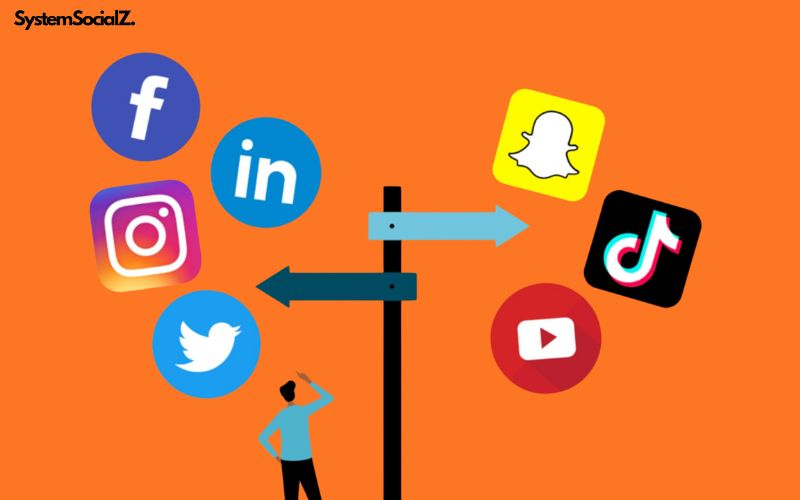 What elements are needed for social media marketing for small business?
What elements are needed for social media marketing for small business?
Content is king in the realm of social media marketing. High-quality, relevant content can capture your audience’s attention and keep them coming back for more. Experiment with various content formats, such as videos, infographics, blog posts, and polls, to determine what your audience engages with the most. Additionally, leverage storytelling to humanize your brand and create an emotional connection with your followers. Sharing behind-the-scenes glimpses of your business or highlighting customer success stories can foster a sense of community around your brand.
Consistency is another critical element in effective social media marketing for small business. Establishing a regular posting schedule helps maintain visibility and keeps your audience engaged. Utilize social media management tools to schedule posts in advance, track engagement metrics, and respond to comments promptly. This proactive approach ensures that your brand remains relevant and accessible to your audience.
Engagement is not a one-way street; it’s essential to interact with your followers actively. Responding to comments and messages shows your audience that you value their opinions and fosters a loyal community. Consider hosting Q&A sessions, running contests, or encouraging user-generated content to boost engagement further.
Lastly, don’t underestimate the power of analytics. Regularly monitor your social media performance to understand what strategies work and which ones need adjustment. Analyzing metrics such as reach, engagement, and conversion rates will help you refine your approach and achieve better results over time.
In conclusion, taking control of your social media marketing is crucial for the success of your small business. By developing a solid strategy, understanding your audience, creating compelling content, maintaining consistency, engaging with your followers, and analyzing your performance, you can harness the power of social media to grow your brand and connect with your customers effectively. The digital world is ever-evolving, and by staying proactive in your social media efforts, your small business can thrive in this dynamic environment.
Social media marketing metrics
Marketing teams utilize social media metrics to assess campaign performance and identify effective strategies, allowing them to refine their approach for better results. Here’s a breakdown of key metrics that provide essential insights into social media marketing for small business:
- Reach: This metric indicates the number of unique individuals who see a particular social media post.
- Impressions: Refers to the total number of times a post is displayed to users, regardless of whether it was clicked.
- Engagements: Captures the total interactions, including likes, comments, clicks, shares, or direct messages, associated with a specific post or an entire account.
- Engagement Rate: This percentage represents the proportion of users who engage with a post compared to those who saw it. You can calculate it using the formula: engagement rate = post engagement / post reach.
- Amplification Rate: This metric shows the percentage of your followers who share a post. The formula is: amplification rate = post shares / total account followers.
- Click-Through Rate (CTR): This indicates the percentage of users who click on a link in your post out of all the times it was displayed. It can be calculated as: click-through rate = post link clicks / post impressions.
- Account Views: Represents the number of individuals who visit your company’s social media profiles.
- Audience Growth Rate: Measures how quickly your audience is expanding, expressed as a percentage. The formula is: audience growth rate = (net new followers over a certain time period / total followers) x 100.
- Cost-Per-Click (CPC): This is a measure of cost-effectiveness, showing how much you pay for each click your post receives. It’s calculated using: CPC = ad spend / number of clicks.
- Conversion Rate: Indicates the percentage of users who complete a desired action, such as making a purchase or filling out a contact form. You can calculate it as: conversion rate = number of people who take a desired action / number of impressions.
- Return on Investment (ROI): This metric assesses the profitability of a social media marketing campaign. The formula is: ROI = profits attributable to a campaign / total campaign cost.
- Mentions: Tracks how many times users mention your company across social platforms.
- Share of Social Voice (SoSV): This metric compares the frequency of your company mentions to those of your competitors, expressed as a percentage. The formula is: SoSV = (number of mentions of your brand / number of mentions of competitor brands) x 100.
- Social Sentiment: This evaluates the distribution of neutral, positive, and negative sentiments regarding your company. The formula for this is: social sentiment = (total number of positive mentions – total number of negative mentions) / total number of mentions.
By monitoring these metrics, small businesses can enhance their social media marketing strategies, driving better engagement and achieving their business goals more effectively.
Social Media Marketing for Small Business in 2025
Social Media Marketing for Real Estate
Social media marketing for real estate focuses on showcasing property listings, engaging with local communities, and building trust with prospective buyers. Real estate agents can leverage platforms like Instagram, Facebook, and LinkedIn to post virtual tours, highlight client testimonials, and promote open houses to attract potential clients.
Social Media Marketing for B2B
Social media marketing for B2B businesses aims to create valuable connections and establish authority in industry-specific networks. By sharing industry insights, case studies, and engaging content on LinkedIn, Twitter, and other platforms, B2B companies can drive meaningful interactions, increase brand trust, and generate qualified leads.
Social Media Marketing for Healthcare
In healthcare, social media marketing plays a crucial role in educating patients, raising awareness, and promoting wellness initiatives. Hospitals, clinics, and practitioners can share useful health tips, updates, and patient testimonials on platforms like Facebook and Instagram to engage the community and build a trusted online presence.
Social Media Marketing for Restaurants
Social media marketing for restaurants focuses on showcasing dishes, events, and dining experiences to attract new customers and retain regulars. Through engaging visuals, promotions, and user-generated content on Instagram, Facebook, and TikTok, restaurants can enhance brand recognition and drive traffic to their physical locations.
 Social Media Marketing For Small Restaurant Business
Social Media Marketing For Small Restaurant Business
Social Media Marketing for Dentists
For dentists, social media marketing emphasizes patient education and practice visibility. By sharing tips on dental care, introducing team members, and posting before-and-after treatment images, dental practices can engage followers on platforms like Instagram and Facebook, establishing credibility and fostering patient trust.
Social Media Marketing for Lawyers
Social media marketing for lawyers focuses on establishing authority and trust within the legal community. Attorneys can share expertise, case insights, and legal tips on platforms like LinkedIn and Twitter to attract potential clients, build credibility, and position themselves as knowledgeable professionals.
Social Media Marketing for Attorneys
Attorneys can benefit from social media by sharing legal insights, client testimonials, and firm updates. Platforms like LinkedIn, Facebook, and Twitter provide a space for attorneys to engage audiences, showcase specialties, and build a network that can lead to client acquisition and partnerships.
Social Media Marketing for Websites
Social media marketing for websites involves driving traffic, enhancing user engagement, and building a loyal audience. By sharing quality content, updates, and exclusive resources on platforms like Twitter, Facebook, and Instagram, website owners can increase visibility, generate clicks, and expand their reach.
Social Media Marketing for Law Firms
Social media marketing for law firms aims to establish the firm’s authority and attract clients by showcasing expertise and community involvement. Through LinkedIn and Twitter, law firms can post case studies, success stories, and legal updates to build trust and expand their network.
Social Media Marketing for Events
Social media marketing for events helps boost attendance, create excitement, and engage audiences before, during, and after the event. By sharing teasers, live updates, and attendee experiences on Instagram, Facebook, and LinkedIn, event organizers can generate buzz and maximize engagement.
Social Media Marketing for Hotels
Social media marketing for hotels focuses on showcasing amenities, local attractions, and guest experiences to drive bookings. By sharing visuals of the property and engaging with guests on platforms like Instagram, Facebook, and Pinterest, hotels can enhance brand appeal and attract potential visitors.
Social Media Marketing for Realtors
Social media marketing for realtors is crucial to connect with local buyers, promote listings, and showcase market expertise. Realtors can share virtual tours, neighborhood highlights, and client testimonials on platforms like Instagram and Facebook, attracting potential clients and building credibility.
Social Media Marketing for Music
Social media marketing for musicians helps promote new releases, concerts, and personal brand. Musicians can share behind-the-scenes content, engage fans, and create excitement on platforms like Instagram, TikTok, and YouTube to grow their audience and connect with fans on a personal level.

How effective is social media marketing for music?
Social Media Marketing for Automotive
Social media marketing for automotive companies allows dealerships and repair shops to showcase services, specials, and industry knowledge. By sharing vehicle highlights, maintenance tips, and customer testimonials on platforms like Facebook and Instagram, they can increase engagement and attract local customers.
Social Media Marketing for Salons
Social media marketing for salons is key to attracting new clients and showcasing expertise. Salons can post before-and-after photos, client testimonials, and seasonal offers on Instagram and Facebook, helping them build a loyal local clientele and boost brand visibility.
Social Media Marketing for Local Business
Social media marketing for small business owners emphasizes community engagement and brand visibility. Local businesses can leverage platforms like Facebook and Instagram to share updates, promote offers, and foster relationships with local audiences, strengthening their presence and driving foot traffic.
Social Media Marketing for Hair Salons
Social media marketing for small business hair salons focuses on creating a portfolio of styles, sharing customer testimonials, and announcing special offers. Hair salons can use Instagram, Facebook, and TikTok to showcase their work, attract new clients, and stay engaged with their followers.
Social Media Marketing for Nonprofits
Social media marketing for small business nonprofits is essential to raise awareness, mobilize supporters, and promote events. Nonprofits can share impact stories, fundraising updates, and volunteer opportunities on Facebook, Instagram, and Twitter, inspiring audiences to get involved and donate.
Social Media Marketing for Financial Services
Social media marketing for small business financial services firms helps educate clients, build credibility, and attract leads. By sharing financial tips, industry insights, and client success stories on LinkedIn, Twitter, and Facebook, financial services providers can enhance brand trust and engage with potential clients.
Social Media Marketing for Ecommerce
Social media marketing for ecommerce businesses leverages platforms to drive online sales, share product updates, and engage with customers. By using ads, influencer partnerships, and interactive posts on Instagram, Facebook, and Pinterest, ecommerce brands can boost traffic, increase conversions, and build loyal communities.
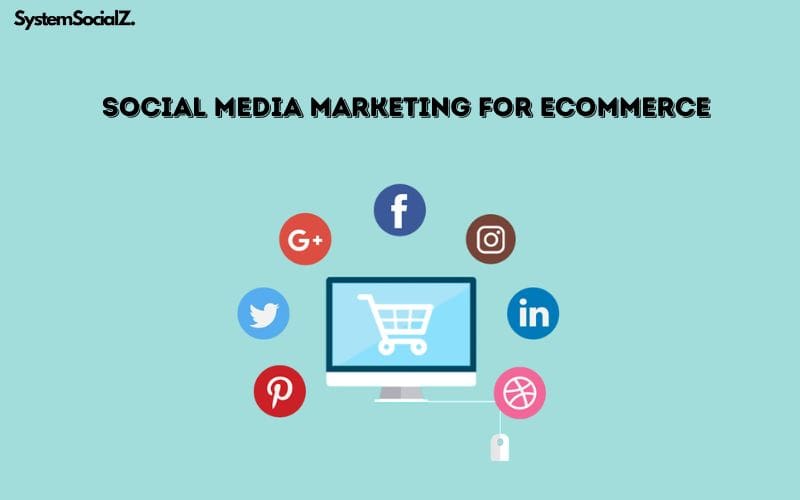
Social Media Marketing for Small Business Ecommerce
Social Media Marketing for SaaS
Social media marketing for SaaS businesses helps showcase product features, share industry insights, and build authority. By creating valuable content and engaging with users on LinkedIn, Twitter, and YouTube, SaaS companies can attract prospects, improve brand visibility, and nurture leads through educational and informative content.
Social Media Marketing for Franchises
Social media marketing for franchises supports brand consistency while attracting local customers. Franchises can share location-specific promotions, customer testimonials, and brand updates on platforms like Facebook and Instagram, helping each location build a loyal community while maintaining a cohesive brand identity across regions.
Social Media Marketing for Car Dealerships
Social media marketing for car dealerships focuses on showcasing inventory, sharing promotions, and highlighting customer testimonials. By posting vehicle videos, maintenance tips, and special deals on Facebook, Instagram, and YouTube, dealerships can attract new customers and keep existing ones engaged.
Social Media Marketing for Construction Companies
Social media marketing for construction companies involves sharing project updates, safety tips, and company achievements. By showcasing completed projects, engaging with the community, and promoting expertise on LinkedIn and Instagram, construction firms can build credibility, attract clients, and expand their network.
Social Media Marketing for Plumbers
Social media marketing for plumbers focuses on engaging local audiences, sharing plumbing tips, and promoting services. Plumbers can use platforms like Facebook and Instagram to post educational content, client testimonials, and service highlights, establishing trust with potential clients and increasing visibility.
Social Media Marketing for Dealerships
Social media marketing for dealerships emphasizes connecting with customers through inventory showcases, promotions, and customer stories. By using Facebook, Instagram, and YouTube to highlight new arrivals, special offers, and after-sales services, dealerships can attract new customers and boost sales.
Social Media Marketing for Doctors
Social media marketing for doctors builds trust, educates patients, and promotes health awareness. Doctors can share wellness tips, service highlights, and patient testimonials on platforms like Facebook, Instagram, and LinkedIn, helping them engage with the community and strengthen patient relationships.
Social Media Marketing for Apartments
Social media marketing for apartments is designed to attract tenants and highlight community features. Apartment managers can share virtual tours, resident testimonials, and neighborhood highlights on Facebook and Instagram, creating a welcoming image and reaching prospective tenants effectively.
Social Media Marketing for Startups
Social media marketing for startups focuses on building brand recognition, attracting early adopters, and engaging with audiences. Startups can share their mission, product demos, and customer stories on platforms like Instagram, Twitter, and LinkedIn, helping them grow a loyal community and gain valuable feedback.
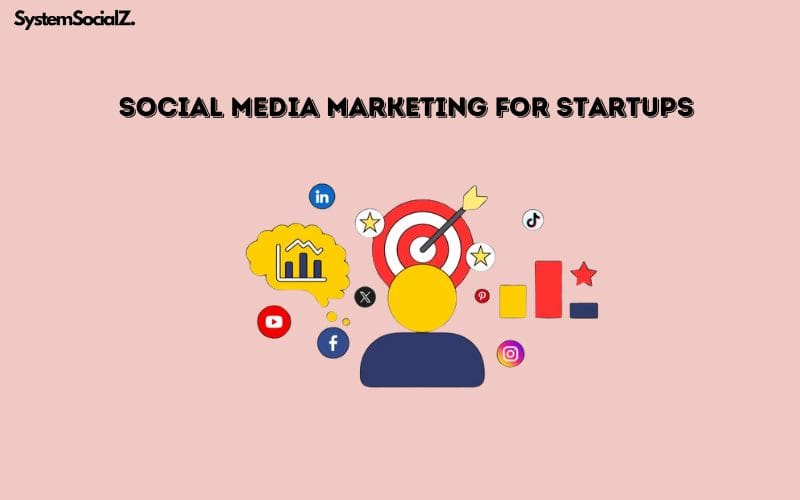 How to effectively start a business through SMM?
How to effectively start a business through SMM?
Social Media Marketing for Artists
Social media marketing for artists focuses on showcasing creative work, connecting with fans, and expanding reach. Artists can use Instagram, Pinterest, and TikTok to share portfolios, create engagement through live sessions, and build a dedicated audience around their art.
Social Media Marketing for Churches
Social media marketing for churches emphasizes community building and spreading messages of faith. Churches can engage members, share sermons, and post event updates on platforms like Facebook and Instagram to foster community connection and reach new members.
Social Media Marketing for Accountants
Social media marketing for accountants helps establish credibility and connect with clients. By sharing financial tips, tax updates, and service information on LinkedIn and Facebook, accountants can attract potential clients, enhance brand trust, and showcase expertise.
Social Media Marketing for Higher Education
Social media marketing for small business institutions in higher education focuses on showcasing campus life, academic programs, and events. Schools and colleges can use Instagram, LinkedIn, and Facebook to reach potential students, engage alumni, and foster a community of lifelong learners.
Social Media Marketing for Insurance
Social media marketing for small business insurance firms centers on building trust and educating clients. Insurance providers can share informative posts, success stories, and industry insights on LinkedIn and Facebook to attract potential clients and promote the importance of coverage options.
Social Media Marketing for Therapists
Social media marketing for therapists aims to create awareness and connect with clients. Therapists can post mental health tips, resources, and self-care reminders on Instagram and Facebook, helping to build trust and making their services accessible to those seeking help.
Social Media Marketing for Gyms
Social media marketing for small business gyms focuses on showcasing classes, motivating members, and attracting new clients. Gyms can share workout videos, client transformations, and special offers on Instagram, Facebook, and YouTube to inspire fitness journeys and drive memberships.
Social Media Marketing for Authors
Social media marketing for authors helps build readership and promote new works. Authors can use platforms like Instagram, Twitter, and Goodreads to share book teasers, author insights, and engage with fans, fostering a loyal reader base and driving book sales.
Social Media Marketing for Contractors
Social media marketing for contractors highlights projects, expertise, and client success stories. Contractors can use LinkedIn, Facebook, and Instagram to showcase their work, share testimonials, and connect with potential clients, strengthening their professional reputation.
Social Media Marketing for CPAs
Social media marketing for CPAs emphasizes expertise in accounting and financial planning. CPAs can share valuable financial tips, industry updates, and client success stories on LinkedIn and Facebook, building a professional online presence that attracts and educates clients.
Social Media Marketing for Home Builders
Social media marketing for home builders showcases recent projects, highlights design expertise, and builds credibility. By sharing construction updates, client testimonials, and finished homes on Instagram and Facebook, home builders can engage potential clients and enhance their local reputation.
Social Media Marketing for Accounting Firms
Social media marketing for accounting firms helps establish trust and reach new clients. By sharing financial advice, tax reminders, and industry insights on LinkedIn and Facebook, accounting firms can showcase their expertise and attract clients who need reliable financial services.
Social Media Marketing for Mortgage Loan Officers
Social media marketing for small business mortgage loan officers emphasizes guidance and financial insights. Loan officers can post informative content, answer FAQs, and share success stories on LinkedIn, Instagram, and Facebook to build trust with potential homebuyers and create a strong referral network.
Social Media Marketing for Fashion Brands
Social media marketing for small business fashion brands boosts visibility, promotes collections, and connects with style-conscious consumers. Fashion brands can showcase products, share style tips, and engage with fans on Instagram, Facebook, and Pinterest to drive interest and encourage purchases.
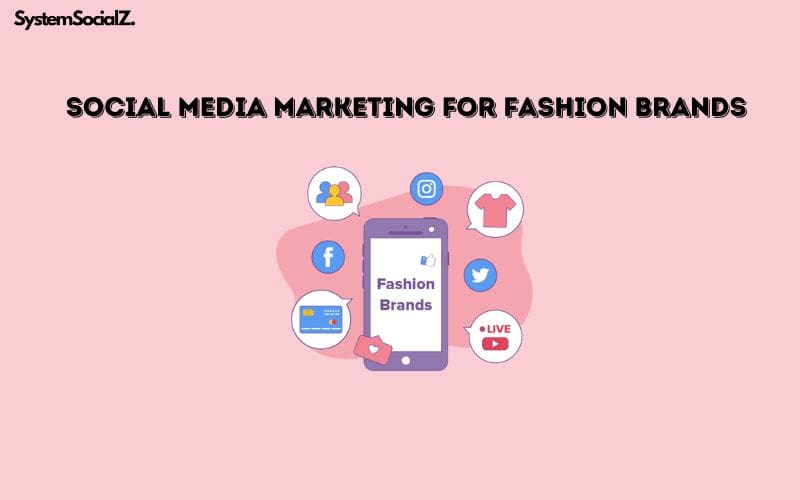 Social Media Marketing For Small Business – Fashion Brand
Social Media Marketing For Small Business – Fashion Brand
Social Media Marketing for Photographers
Social media marketing for small business photographers is crucial for showcasing portfolios and engaging with clients. By sharing their best work, client stories, and behind-the-scenes content on Instagram and Facebook, photographers can build an engaged following and attract potential clients.
Social Media Marketing for Spas
Social media marketing for small business spas enhances visibility and customer engagement. By sharing treatment highlights, wellness tips, and client testimonials on Instagram and Facebook, spas can attract new clients and build a reputation for relaxation and wellness in the community.
Social Media Marketing for the Hospitality Industry
Social media marketing for small business in the hospitality industry helps boost brand appeal and attract guests. Hotels and restaurants can showcase experiences, share guest stories, and promote special offers on Instagram and Facebook, creating a welcoming presence to attract travelers.
Social Media Marketing for Fitness
Social media marketing for small business fitness centers boosts client engagement and attracts new members. By sharing workout tips, client success stories, and fitness challenges on Instagram, Facebook, and YouTube, gyms and trainers can motivate clients and create an active online community.
Social Media Marketing for Roofers
Social media marketing for small business roofers highlights services, showcases projects, and builds local credibility. By sharing project updates, client testimonials, and maintenance tips on Facebook and Instagram, roofers can attract new clients and position themselves as trusted professionals in the community.
Social Media Marketing for Cafés
Social media marketing for small business cafés focuses on attracting foot traffic and fostering community. Cafés can post mouthwatering photos of their menu, engage with customers, and promote events on Instagram and Facebook to build a loyal local following and attract new patrons.
Social Media Marketing for Vacation Rentals
Social media marketing for vacation rentals helps capture potential guests by showcasing properties and unique features. Platforms like Instagram and Facebook allow hosts to share property photos, nearby attractions, and guest reviews, creating an appealing online presence that boosts bookings and builds trust with future guests.
Social Media Marketing for Films
Social media marketing for films enhances visibility, builds anticipation, and engages audiences. By sharing trailers, behind-the-scenes footage, and cast insights on platforms like Instagram, Facebook, and Twitter, filmmakers can create a loyal fan base and promote their films to diverse audiences.
Social Media Marketing for Mortgage
Social media marketing for mortgage companies focuses on educating clients and building trust. By sharing mortgage tips, interest rate updates, and success stories on LinkedIn and Facebook, mortgage lenders can provide valuable insights to potential clients, positioning themselves as trusted advisors in the home-buying journey.
Social Media Marketing for Financial Services
Social media marketing for small business financial services firms helps educate clients, build credibility, and attract leads. By sharing financial tips, industry insights, and client success stories on LinkedIn, Twitter, and Facebook, financial services providers can enhance brand trust and engage with potential clients.
Social media marketing for resorts highlights luxurious amenities, scenic views, and unique experiences. Resorts can use Instagram, Facebook, and Pinterest to showcase their offerings, engage with guests, and create a captivating online presence that entices travelers and boosts reservations.
Social Media Marketing for Roofing Companies
Social media marketing for roofing companies builds local credibility by showcasing completed projects and sharing maintenance tips. Roofing companies can use platforms like Facebook and Instagram to post client testimonials, project photos, and service information, helping attract new clients and build community trust.
Social Media Marketing for HVAC Companies
Social media marketing for HVAC companies connects with clients by providing seasonal tips, maintenance advice, and service highlights. HVAC companies can use Facebook and Instagram to share informative posts and promotions, building trust with potential clients and maintaining visibility within their community.
Social Media Marketing for Interior Designers
Social media marketing for interior designers showcases creativity, completed projects, and design inspiration. By using Instagram, Pinterest, and Facebook to share portfolio highlights, design tips, and client testimonials, interior designers can attract potential clients and create a unique, engaging brand presence online.
Social Media Marketing for Pest Control
Social media marketing for pest control companies helps educate clients and build trust. By sharing prevention tips, seasonal warnings, and service highlights on platforms like Facebook and Instagram, pest control businesses can create awareness and establish themselves as reliable, knowledgeable professionals in the community.
Social Media Marketing for Clothing Brands
Social media marketing for clothing brands increases visibility, engages fashion-forward audiences, and drives sales. Clothing brands can use Instagram, TikTok, and Pinterest to showcase collections, promote discounts, and connect with followers, building a strong online presence that appeals to their style-conscious audience.
Social Media Marketing for Plastic Surgeons
Social media marketing for plastic surgeons focuses on sharing expertise, patient stories, and procedure information. By posting before-and-after photos, FAQs, and success stories on Instagram and Facebook, plastic surgeons can engage potential clients, educate them, and foster trust through an informative, professional online presence.
Social Media Marketing for Manufacturing Companies
Social media marketing for manufacturing companies highlights product innovation, processes, and industry expertise. Manufacturing firms can use LinkedIn and Facebook to share case studies, production updates, and quality standards, creating a professional online presence that appeals to clients and demonstrates their industry knowledge and reliability.
Social Media Marketing for Estate Agents
Social media marketing for estate agents helps build trust and showcase property listings. Agents can use Instagram and Facebook to share virtual tours, neighborhood highlights, and success stories, reaching a wider audience and connecting with potential buyers and sellers through engaging, informative content.
Social Media Marketing for Personal Trainers
Social media marketing for small business personal trainers emphasizes fitness expertise and client success stories. Trainers can use Instagram, YouTube, and Facebook to share workout tips, client testimonials, and motivational content, inspiring followers, attracting new clients, and building a dedicated fitness community.
Social Media Marketing for Service Business
Social media marketing for service-based businesses focuses on showcasing expertise and building client relationships. Businesses can share tips, client testimonials, and service highlights on LinkedIn, Facebook, and Instagram to build credibility, reach new clients, and foster lasting relationships with their online audience.
Social Media Marketing for Older Adults
Social media marketing for older adults involves creating accessible, informative, and engaging content. Platforms like Facebook and YouTube can be used to share helpful guides, community activities, and wellness tips, connecting with older audiences and providing valuable resources that encourage engagement and build trust.
Social Media Marketing for Coaches
Social media marketing for coaches builds credibility and engages potential clients. Coaches can use Instagram, LinkedIn, and Facebook to share success stories, motivational tips, and service information, creating an online space that showcases their expertise and connects with clients ready to achieve their goals.
Social Media Marketing for Makeup Artists
Social media marketing for small business makeup artists boosts visibility and highlights artistry. Platforms like Instagram and TikTok are ideal for sharing tutorials, client transformations, and beauty tips, helping makeup artists build a dedicated following and attract clients seeking professional services.
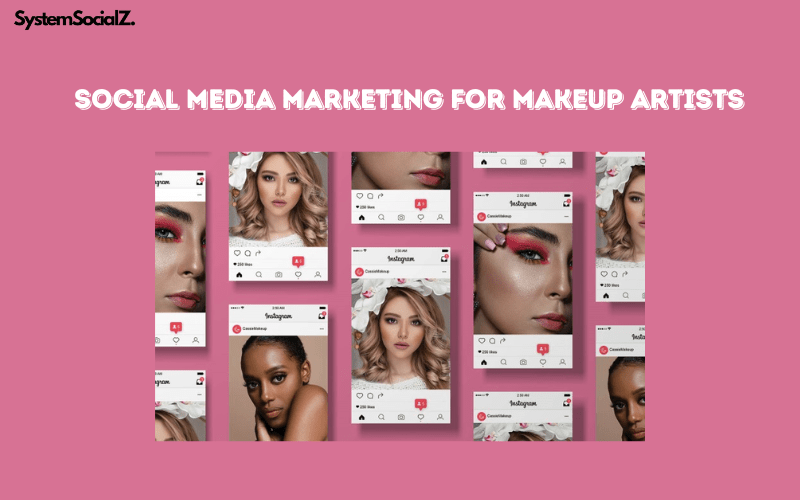 Social Media Marketing For Small Business – Makeup Artists
Social Media Marketing For Small Business – Makeup Artists
Social Media Marketing for Industrial Companies
Social media marketing for industrial companies showcases capabilities, industry knowledge, and reliability. Companies can use LinkedIn and Facebook to share project highlights, equipment details, and success stories, establishing a strong, credible online presence that attracts business clients and reinforces industry trust.
Social Media Marketing for Hairstylists
Social media marketing for small business hairstylists builds engagement and showcases talent. Hairstylists can use Instagram and Facebook to share before-and-after photos, styling tips, and client reviews, attracting new clients and creating a portfolio that highlights their unique style and expertise.
Social Media Marketing for Bakery
Social media marketing for small business bakeries appeals to local customers and food lovers. By sharing photos of their delicious creations, seasonal treats, and behind-the-scenes baking content on Instagram and Facebook, bakeries can create an irresistible online presence that attracts loyal patrons and boosts sales.
Social Media Marketing for Wholesale Business
Social media marketing for wholesale businesses highlights products, builds credibility, and reaches potential buyers. By showcasing new items, sharing industry insights, and engaging with business clients on LinkedIn and Instagram, wholesalers can create a professional online presence and expand their customer network.
Social Media Marketing for Politicians
Social media marketing for politicians engages constituents and shares campaign messages. Politicians can use Twitter, Facebook, and Instagram to update followers on policy positions, community events, and achievements, creating a transparent and interactive platform to connect with voters and build trust.
Social Media Marketing for Architecture Firms
Social media marketing for small business architecture firms showcases designs and creativity. Architecture firms can share project updates, completed work, and design insights on Instagram, LinkedIn, and Pinterest, creating a visually engaging portfolio that appeals to clients and highlights the firm’s architectural vision.
Social Media Marketing for Consulting Firms
Social media marketing for consulting firms builds expertise and connects with clients. By sharing industry insights, client success stories, and thought leadership content on LinkedIn and Twitter, consulting firms can establish themselves as trusted advisors and reach new clients with valuable information.
Social Media Marketing for Sports Teams
Social media marketing for small businesssports teams strengthens fan engagement and builds excitement. Teams can use platforms like Instagram, Twitter, and TikTok to share game highlights, player updates, and behind-the-scenes content, creating a loyal fanbase that feels connected to the team’s journey.
Social Media Marketing for Bars
Social media marketing for bars attracts patrons and showcases events. Bars can use Instagram and Facebook to share drink specials, live music schedules, and atmosphere photos, creating a fun online presence that encourages visitors to stop by and enjoy the experience.
Social Media Marketing for Fitness Centers
Social media marketing for fitness centers inspires members and attracts new clients. Gyms and fitness studios can share workout tips, success stories, and class updates on Instagram and Facebook, building a supportive community that motivates followers to prioritize their health.
Social Media Marketing for Hospitals
Social media marketing for hospitals builds trust and educates patients. Hospitals can share health tips, medical services, and community stories on Facebook and LinkedIn, creating a helpful online presence that reassures patients and highlights the hospital’s commitment to quality care.
Social Media Marketing for Nutritionists
Social media marketing for nutritionists helps attract clients and share valuable insights. Nutritionists can use Instagram and Facebook to post meal plans, healthy recipes, and tips on balanced living, creating an informative, engaging platform that promotes a healthy lifestyle.
Social Media Marketing for Luxury Brands
Social media marketing for luxury brands cultivates exclusivity and elegance. By sharing high-quality visuals, brand stories, and exclusive collections on Instagram and Pinterest, luxury brands can create a sophisticated online image that attracts affluent customers and reinforces brand prestige.
Social Media Marketing for Pubs
Social media marketing for small business pubs boosts local presence and event turnout. By sharing photos of unique drinks, pub events, and patron moments on Instagram and Facebook, pubs can create a lively online presence that attracts regulars and new visitors to their space.
Social Media Marketing for Clinics
Social media marketing for clinics builds patient trust and awareness. Clinics can share health tips, patient testimonials, and service highlights on Facebook and Instagram, creating an informative platform that educates and reassures clients while showcasing the clinic’s healthcare expertise.
Social Media Marketing for Etsy Sellers
Social media marketing for Etsy sellers boosts visibility and drives traffic to their stores. Sellers can use Instagram, Pinterest, and Facebook to share product photos, shop updates, and customer reviews, building a loyal audience interested in unique, handmade items.
Social Media Marketing for Auto Repair Shops
Social media marketing for auto repair shops enhances local visibility and builds trust. Shops can use Facebook and Instagram to post service updates, customer reviews, and maintenance tips, creating a reliable online presence that attracts clients seeking expert vehicle care.
Social Media Marketing for Bloggers
Social media marketing for bloggers grows readership and boosts engagement. Bloggers can use Instagram, Twitter, and Facebook to share blog updates, topic insights, and reader feedback, building a supportive community that enhances the blog’s reach and creates loyal followers.

How effective is Socail Media Marketing for Blogger?
Social Media Marketing for Breweries
Social media marketing for small business breweries showcases craft beers and events. Breweries can use Instagram, Facebook, and Pinterest to share brewing processes, new flavors, and community events, creating an inviting online presence that attracts beer enthusiasts and local patrons.
Social Media Marketing for Clothing Stores
Social media marketing for clothing stores attracts fashion-conscious shoppers. Stores can use Instagram, Pinterest, and Facebook to showcase new collections, styling ideas, and seasonal discounts, creating an engaging space that encourages followers to explore and shop.
Social Media Marketing for Cosmetic Surgeons
Social media marketing for cosmetic surgeons educates clients and builds trust. Surgeons can use Instagram and Facebook to share before-and-after photos, client testimonials, and procedural information, creating an informative and professional online presence that reassures and attracts potential clients.
Social Media Marketing for Recruitment
Social media marketing for small business recruitment firms highlights job opportunities and industry insights. Firms can use LinkedIn and Twitter to post job listings, career advice, and employer success stories, establishing themselves as knowledgeable, reliable partners for both job seekers and employers.
Social Media Marketing for Bookkeepers
Social media marketing for bookkeepers builds client trust and showcases expertise. Bookkeepers can use LinkedIn and Facebook to share tips on budgeting, financial planning, and tax preparation, creating an approachable, professional online presence that appeals to clients seeking reliable financial support.
Social Media Marketing for Furniture Stores
Social media marketing for furniture stores showcases products and inspires customers. By sharing high-quality images of furniture collections, design tips, and customer testimonials on platforms like Instagram and Pinterest, stores can engage potential buyers and create a visually appealing online shopping experience.
Social Media Marketing for Architects
Social media marketing for small business architects highlights innovative designs and projects. Architects can use platforms like Instagram and LinkedIn to share project updates, design inspirations, and architectural insights, establishing credibility and attracting potential clients interested in unique and functional designs.
Social Media Marketing for Educational Institutions
Social media marketing for educational institutions enhances visibility and engagement. Schools and universities can share news, student achievements, and program highlights on Facebook and Instagram, fostering a strong community presence and attracting prospective students through informative and engaging content.
Social Media Marketing for Trucking Companies
Social media marketing for small business trucking companies builds brand awareness and trust. By sharing industry news, safety tips, and behind-the-scenes content on LinkedIn and Facebook, trucking firms can engage clients and establish themselves as reliable partners in transportation and logistics.
Social Media Marketing for Amazon Sellers
Social media marketing for Amazon sellers drives traffic and boosts sales. Sellers can use platforms like Instagram and Facebook to promote product launches, share customer reviews, and engage with followers, creating a strong online presence that enhances visibility and attracts potential buyers.
Social Media Marketing for Mortgage Brokers
Social media marketing for mortgage brokers builds trust and educates clients. Brokers can share mortgage tips, success stories, and market insights on LinkedIn and Facebook, positioning themselves as knowledgeable resources and attracting homebuyers seeking financing guidance.
Social Media Marketing for Travel Industry
Social media marketing for the travel industry inspires wanderlust and showcases destinations. Travel agencies can share stunning visuals, travel tips, and special offers on Instagram and Facebook, engaging potential travelers and creating a community passionate about exploring the world.
Social Media Marketing for Retail Stores
Social media marketing for retail stores drives foot traffic and online sales. Stores can use Instagram, Facebook, and TikTok to share product showcases, promotions, and customer stories, creating an engaging online presence that attracts and retains shoppers.
Social Media Marketing for Landscaping
Social media marketing for landscaping companies showcases services and inspires homeowners. By sharing project photos, gardening tips, and seasonal advice on Instagram and Facebook, landscaping firms can engage potential clients and build a strong local presence in their communities.
Social Media Marketing for Jewelry
Social media marketing for small business jewelry brands highlights unique designs and craftsmanship. Jewelers can use Instagram and Pinterest to share stunning product images, styling ideas, and customer stories, creating an aspirational online presence that attracts jewelry lovers and boosts sales.
Social Media Marketing for Brand Awareness
Social media marketing for brand awareness focuses on creating a recognizable identity. Companies can use platforms like Instagram, Facebook, and Twitter to share brand stories, values, and customer engagement initiatives, building a loyal community and enhancing brand recognition in the marketplace.
Social Media Marketing for Cleaning Business
Social media marketing for cleaning businesses promotes services and builds trust. By sharing before-and-after photos, cleaning tips, and customer testimonials on Facebook and Instagram, cleaning companies can engage potential clients and showcase their expertise in maintaining clean, healthy spaces.
Social Media Marketing for Staffing Companies
Social media marketing for staffing companies highlights job opportunities and industry insights. Firms can use LinkedIn and Facebook to post job listings, share success stories, and offer career advice, establishing themselves as reliable partners for both job seekers and employers.
Social Media Marketing for Apartment Communities
Social media marketing for apartment communities attracts prospective tenants and builds a sense of community. Property managers can use Instagram and Facebook to share community events, resident stories, and property features, creating an inviting online atmosphere that appeals to potential renters.
Social Media Marketing for Food Business
 Social Media Marketing For Small Business – Food Business
Social Media Marketing For Small Business – Food Business
Social media marketing for food businesses showcases culinary creations and attracts customers. Restaurants and food vendors can use Instagram and TikTok to share mouthwatering photos, cooking tips, and behind-the-scenes content, building a vibrant online presence that entices food lovers to visit.
Social Media Marketing for Celebrities
Social media marketing for celebrities enhances personal branding and engages fans. Celebrities can use platforms like Instagram and Twitter to share personal insights, behind-the-scenes moments, and upcoming projects, building a loyal fanbase and maintaining a strong public presence.
Social Media Marketing for Psychologists
Social media marketing for psychologists promotes mental health awareness and builds trust. Psychologists can use platforms like Instagram and Facebook to share helpful tips, client success stories, and educational content, creating a supportive online space that encourages engagement and destigmatizes mental health issues.
Social Media Marketing for Athletes
Social media marketing for athletes builds personal brands and connects with fans. Athletes can use Instagram and Twitter to share training routines, competition updates, and personal insights, fostering a strong relationship with followers and enhancing their visibility in the sports world.
Social Media Marketing for Charities
Social media marketing for small business charities raises awareness and drives donations. Organizations can share impactful stories, upcoming events, and fundraising campaigns on platforms like Facebook and Instagram, engaging supporters and inspiring community involvement in their mission.
Social Media Marketing for Car Salesmen
Social media marketing for car salesmen enhances visibility and attracts buyers. Salesmen can use Facebook and Instagram to showcase inventory, share customer success stories, and provide helpful car-buying tips, creating an engaging online presence that drives sales and builds customer relationships.
Social Media Marketing for Logistics Companies
Social media marketing for small business logistics companies enhances visibility and builds trust. By sharing industry insights, service updates, and success stories on platforms like LinkedIn and Facebook, logistics firms can engage clients, showcase their expertise, and position themselves as reliable partners in supply chain management.
Social Media Marketing for Record Labels
Social media marketing for record labels promotes artists and music releases. Labels can utilize platforms like Instagram, Facebook, and TikTok to share music videos, artist interviews, and upcoming events, engaging fans and building a community around their artists while driving awareness and sales.
Social Media Marketing for Entrepreneurs
Social media marketing for entrepreneurs highlights personal brands and business ventures. Entrepreneurs can share insights, challenges, and success stories on platforms like LinkedIn and Instagram, fostering connections, attracting potential investors, and inspiring others while building a supportive community around their journey.
Social Media Marketing for Boutiques
Social media marketing for boutiques showcases unique fashion items and builds customer loyalty. Boutiques can use Instagram and Pinterest to share style inspirations, new arrivals, and customer features, creating an engaging online shopping experience that attracts and retains fashion-conscious shoppers.
Social Media Marketing for Cosmetics
Social media marketing for cosmetics brands drives product visibility and engagement. By sharing makeup tutorials, beauty tips, and user-generated content on Instagram and TikTok, cosmetic brands can connect with beauty enthusiasts and showcase their products, fostering a vibrant online community.
Social Media Marketing for Creatives
Social media marketing for creatives highlights artistic work and builds a personal brand. Artists, designers, and creators can share their projects, creative processes, and inspirations on platforms like Instagram and Behance, attracting followers and potential clients while fostering a community of fellow creatives.
Social Media Marketing for Credit Unions
Social media marketing for credit unions builds community trust and member engagement. Credit unions can share financial tips, community events, and member success stories on platforms like Facebook and Instagram, fostering relationships and enhancing their visibility as local financial institutions.
Social Media Marketing for Engineering Firms
Social media marketing for engineering firms showcases expertise and project achievements. By sharing case studies, technical insights, and industry news on LinkedIn and Twitter, engineering firms can engage potential clients, demonstrate their capabilities, and build a reputable online presence.
Social Media Marketing for Event Planners
Social media marketing for event planners showcases creativity and successful events. Planners can use platforms like Instagram and Facebook to share event highlights, planning tips, and client testimonials, attracting potential clients and establishing themselves as experts in the event planning industry.
Social Media Marketing for Event Promotion
Social media marketing for event promotion drives attendance and engagement. Event organizers can share event details, sneak peeks, and behind-the-scenes content on platforms like Facebook and Instagram, creating buzz and excitement that encourages people to participate and share with their networks.
Social Media Marketing for Farmers
Social media marketing for farmers connects them with consumers and builds brand awareness. Farmers can share their practices, produce updates, and sustainability efforts on platforms like Instagram and Facebook, fostering community support and promoting the benefits of locally sourced food.

Social Media Marketing For Small Business – Farmers
Social Media Marketing for Fundraising
Social media marketing for fundraising campaigns raises awareness and encourages donations. Nonprofits can use platforms like Facebook and Instagram to share compelling stories, impact updates, and donation links, engaging supporters and creating a sense of urgency around their causes.
Social Media Marketing for Funeral Homes
Social media marketing for funeral homes provides support and information to families. Funeral homes can share grief resources, service information, and community events on Facebook and Instagram, fostering trust and compassion while engaging with the families they serve.
Social Media Marketing for Grocery Stores
Social media marketing for grocery stores enhances customer engagement and promotes products. Grocery stores can share recipes, promotions, and seasonal items on platforms like Instagram and Facebook, creating a vibrant online community that encourages shoppers to explore and visit their stores.
Social Media Marketing for Home Inspectors
Social media marketing for home inspectors builds credibility and attracts clients. Inspectors can share tips, industry insights, and client testimonials on platforms like LinkedIn and Facebook, establishing themselves as trustworthy professionals and educating homeowners on the importance of inspections.
Social Media Marketing for Introverts
Social media marketing for introverts focuses on creating a supportive community. By sharing tips, personal experiences, and relatable content on platforms like Instagram and Twitter, introverts can connect with others, foster understanding, and build confidence in their social interactions.
Social Media Marketing for Libraries
Social media marketing for libraries promotes literacy and community engagement. Libraries can share reading lists, event updates, and educational resources on Facebook and Instagram, fostering a love for reading and encouraging community participation in library programs and services.
Social Media Marketing for Millennials
Social media marketing for millennials targets their interests and values. Brands can use platforms like Instagram and TikTok to share relatable content, sustainability initiatives, and lifestyle tips, fostering engagement and brand loyalty among this influential generation.
Social Media Marketing for Mobile Games
Social media marketing for small business mobile games promotes engagement and downloads. Game developers can share gameplay videos, updates, and player testimonials on platforms like Instagram and TikTok, creating excitement and building a community around their games.
Social Media Marketing for Mortgage Lenders
Social media marketing for mortgage lenders builds trust and educates clients. Lenders can share industry insights, financing tips, and success stories on platforms like LinkedIn and Facebook, positioning themselves as knowledgeable resources for homebuyers navigating the mortgage process.
Social Media Marketing for Museums
Social media marketing for museums enhances visitor engagement and promotes exhibitions. Museums can share behind-the-scenes content, educational resources, and event updates on platforms like Instagram and Facebook, fostering a community of art and culture enthusiasts while driving foot traffic.
Social Media Marketing for New Home Builders
Social media marketing for new home builders showcases innovative designs and available properties. Builders can share project updates, client testimonials, and design inspirations on Instagram and Facebook, attracting potential buyers and building a strong brand presence in the housing market.
Social Media Marketing for Oil and Gas
Social media marketing for oil and gas companies promotes transparency and industry insights. Companies can share environmental initiatives, safety practices, and technological advancements on LinkedIn and Twitter, enhancing their reputation and engaging stakeholders in the energy sector.
Social Media Marketing for Online Store
Social media marketing for online stores drives traffic and sales. E-commerce businesses can share product showcases, promotions, and customer reviews on platforms like Instagram and Facebook, creating an engaging online shopping experience that attracts and retains customers.
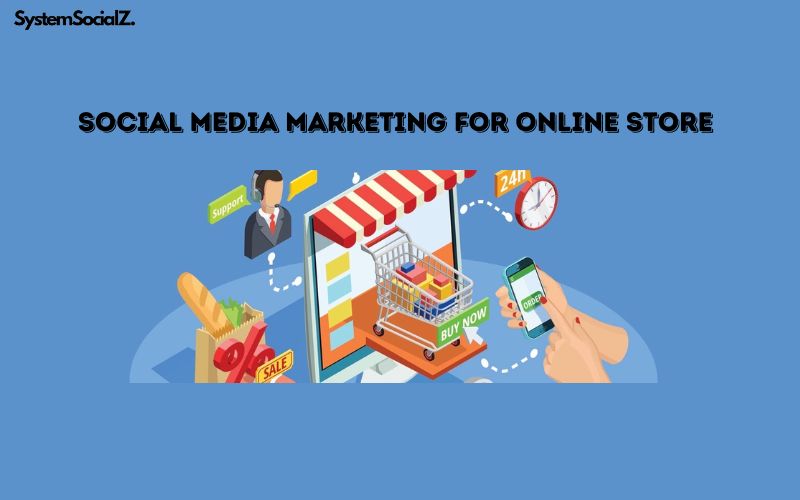 How to do online business through SMM effectively?
How to do online business through SMM effectively?
Social Media Marketing for Optometry
Social media marketing for optometry practices promotes eye health and patient engagement. Optometrists can share vision tips, product information, and patient testimonials on platforms like Facebook and Instagram, building trust and encouraging individuals to prioritize their eye care.
Social Media Marketing for Orthodontics
Social media marketing for orthodontic practices highlights services and patient transformations. Orthodontists can share before-and-after photos, treatment options, and patient success stories on Instagram and Facebook, fostering engagement and attracting potential clients seeking orthodontic solutions.
Social Media Marketing for Pharmaceuticals
Social media marketing for pharmaceutical companies enhances brand awareness and patient education. Companies can share product information, health tips, and research updates on platforms like LinkedIn and Twitter, building credibility and fostering trust within the healthcare community.
Social Media Marketing for Small Business Photography
Social media marketing for photography showcases artistic work and attracts clients. Photographers can share portfolios, behind-the-scenes content, and client testimonials on Instagram and Facebook, creating a visually stunning online presence that engages potential customers and builds brand loyalty.
Social Media Marketing for Physicians
Social media marketing for physicians fosters patient engagement and health education. Physicians can share health tips, medical news, and patient testimonials on platforms like Facebook and Instagram, building trust and encouraging proactive health management among their patients.
Social Media Marketing for Private Schools
Social media marketing for private schools highlights academic achievements and community involvement. Schools can share success stories, event updates, and student testimonials on Facebook and Instagram, attracting prospective students and building a strong online presence in the educational community.
Social Media Marketing for Retail Brands
Social media marketing for retail brands drives engagement and boosts sales. Brands can share product launches, promotions, and customer stories on platforms like Instagram and Facebook, creating an appealing online presence that encourages shopping and builds brand loyalty.
Social Media Marketing for Singers
Social media marketing for singers promotes music and engages fans. Artists can share music videos, behind-the-scenes content, and personal insights on platforms like Instagram and TikTok, building a loyal fanbase and enhancing their visibility in the music industry.
Social Media Marketing for Skin Care
Social media marketing for small business skin care brands highlights products and beauty tips. Brands can use Instagram and TikTok to share tutorials, customer reviews, and ingredient highlights, creating a vibrant online community that engages skincare enthusiasts and drives product sales.
Social Media Marketing for Sports
Social media marketing for sports organizations engages fans and promotes events. Teams can share game highlights, player interviews, and behind-the-scenes content on platforms like Instagram and Twitter, building a passionate community and driving ticket sales for upcoming events.
Social Media Marketing for Theatre
Social media marketing for theatre companies promotes productions and engages audiences. Theatres can share rehearsal photos, cast interviews, and event updates on platforms
Shape Your Social Media Success with SystemSocialZ

What benefits will you receive by cooperating with SystemSocial?
Amid the ever-evolving digital terrain, having a strong social media presence is crucial for small businesses looking to grow and thrive. Collaborating with SystemSocialZ can significantly enhance your social media marketing efforts, positioning your brand among the best social media marketing companies for small business. Here are some key benefits of partnering with SystemSocialZ:
Expertise and Experience: SystemSocialZ boasts a team of seasoned professionals who specialize in social media marketing. With extensive experience in various industries, they understand the unique challenges small businesses face. Their insights can help you navigate the ever-changing social media landscape, ensuring that your marketing strategies are effective and relevant.
Tailored Strategies: One of the standout features of SystemSocialZ is their commitment to crafting customized social media strategies. They take the time to understand your business goals, target audience, and brand identity. By developing a personalized approach, they can help you reach your specific objectives, whether it’s increasing brand awareness, driving website traffic, or generating leads.
Content Creation and Management: Quality content is at the heart of successful social media marketing. SystemSocialZ excels in creating engaging and visually appealing content that resonates with your audience. They manage your social media accounts, ensuring consistent posting and interaction with followers. This allows you to focus on other essential aspects of your business while knowing your social media presence is in capable hands.
Analytics and Reporting: Understanding the performance of your social media campaigns is vital for continuous improvement. SystemSocialZ provides detailed analytics and reporting, giving you insights into what’s working and what needs adjustment. This data-driven approach helps you make informed decisions and optimize your marketing strategies over time.
Cost-Effectiveness: For small businesses, budget constraints are a common concern. Collaborating with SystemSocialZ offers a cost-effective solution to enhance your social media marketing. Their services are designed to deliver a strong return on investment, ensuring you get the most out of your marketing budget.
Staying Ahead of Trends: The social media landscape is constantly evolving, with new trends and platforms emerging regularly. SystemSocialZ stays updated on the latest trends, ensuring your business remains relevant and competitive. By leveraging their expertise, you can take advantage of new opportunities and adapt your strategies accordingly.
All in all, partnering with SystemSocialZ is a strategic move for small businesses aiming to excel in social media marketing. With their expertise, tailored strategies, and commitment to delivering results, they stand out as one of the best social media marketing companies for small business. By choosing SystemSocialZ, you can shape your social media success and drive your business toward greater heights.
Social Media Marketing For Small Business – Frequently Asked Questions
What Do Social Media Marketers Do?
Social media marketers are responsible for promoting a company’s products or services across various social media platforms. Their tasks may include developing a comprehensive social media strategy, keeping an eye on emerging trends, creating engaging content, scheduling and publishing posts, and monitoring and analyzing performance metrics.
What Types of Content Perform Best on Social Media?
While the effectiveness of content can vary by platform, certain types of content generally resonate well across social media channels, including:
- Short-form videos: Popular on TikTok, YouTube, and Instagram
- User-generated content: Frequently shared on Instagram, Twitter, LinkedIn, and Facebook
- Company culture content: Commonly seen on Facebook, LinkedIn, and Twitter
- High-quality images: Particularly effective on Pinterest, Instagram, and Facebook
- Infographics: Well-received on Twitter, Pinterest, Instagram, LinkedIn, and Facebook
How Can Businesses Measure the Success of Their Social Media Marketing Campaigns?
To gauge the effectiveness of their social media marketing efforts, businesses track various metrics, including engagement levels, reach, click-through rates, and conversion rates. These metrics help calculate the return on investment (ROI) for their campaigns.
What Are Some Common Social Media Marketing Mistakes to Avoid?
Businesses that are new to social media marketing often fall into several common pitfalls, such as:
- Selecting inappropriate platforms for their target audience.
- Failing to track key social media metrics.
- Infrequent posting.
- Overemphasizing promotional content.
- Ignoring community management efforts.
How can I create engaging content for social media?
To create engaging content for social media, consider the following strategies:
- Know Your Audience: Grasp the preferences, interests, and challenges of your target demographic. Customize your content to connect with them meaningfully.
- Use Visuals: Incorporate high-quality images, infographics, and videos to capture attention. Visual content generally achieves higher engagement and is shared more frequently.
- Tell a Story: Share relatable stories or experiences that evoke emotions. Storytelling can create a deeper connection with your audience.
- Be Genuine: Reveal the human aspect of your brand. Genuine interactions build trust and boost engagement.
- Encourage Interaction: Ask questions, create polls, and encourage comments. Engaging your audience in conversations can increase interaction and visibility.
- Utilize Trends: Keep an eye on trending topics and incorporate them into your content when relevant. Staying current can help your content reach a broader audience.
- Provide Value: Share informative or entertaining content that adds value to your audience’s lives. This could include tips, how-tos, or industry insights.
How much should I invest in social media advertising?
The amount you should invest in social media advertising depends on several factors, including:
- Business Goals: Determine your objectives (e.g., brand awareness, lead generation, sales) and allocate budget accordingly.
- Platform Costs: Each platform has its pricing structure. For example, Facebook and Instagram may require different budgets based on your target audience and competition.
- Target Audience Size: A broader audience may require a higher budget to effectively reach potential customers.
- Campaign Duration: Consider how long you plan to run your ads. Longer campaigns will require more investment.
As a general guideline, many businesses start with a budget of around 5-10% of their total revenue for marketing, including social media. Monitor your results and adjust your budget based on performance and return on investment (ROI).
Should I hire a social media marketing expert?
Hiring a social media marketing expert can be beneficial, especially if:
- You Lack Expertise: If you don’t have experience in social media marketing, an expert can help develop and execute a strategy effectively.
- Time Constraints: Managing social media requires consistent effort. An expert can save you time by handling the day-to-day tasks.
- You Want to Maximize Results: Professionals have the knowledge and tools to optimize campaigns and analyze performance, potentially leading to better outcomes.
- You’re Looking to Scale: If your business is growing and you want to expand your social media presence, an expert can help you create a more robust strategy.
Conclusion
As a final point, social media marketing for small businesses seeking to thrive in the digital age. As we journey into 2025, the landscape of social media is continuously evolving. By understanding these trends and implementing the strategies outlined in this guide, small businesses can effectively leverage platforms like TikTok, Instagram, and Facebook to connect with their target audience, build brand loyalty, and drive sales.
Remember, the key to successful social media marketing lies in consistency, creativity, and a deep understanding of your audience. SystemSocialZ is here to support you every step of the way, providing the tools and insights you need to make your social media marketing efforts a resounding success.
Read more:
- Social media marketing agencies
- Social media marketing services
- Social media marketing strategies
- Social media marketing specialists
- Social media marketing companies
- Social media marketing for real estate
- Social media marketing for b2b
- Social media marketing for healthcare
- Social media marketing for restaurants
- Social media marketing for dentists
- Social media marketing for lawyers
- Social media marketing for website
- Social media marketing for law firms
- Social media marketing for events
- Social media marketing for chiropractors
- Social media marketing for hotels
- Social media marketing for realtors
- Social media marketing for music
- Social media marketing for automotive
- Social media marketing for salons
- Social media marketing for local business
- Social media marketing for hair salons
- Social media marketing for financial advisors
- Social media marketing for ecommerce
- Social media marketing for saas
- Social media marketing for franchises
- Social media marketing for car dealerships
- Social media marketing for construction companies
- Social media marketing for plumbers
- Social media marketing for dealerships
- Social media marketing for doctors
- Social media marketing for apartments
- Social media marketing for startups
- Social media marketing for artists
- Social media marketing for churches
- Social media marketing for accountants
- Social media marketing for higher education
- Social media marketing for insurance
- Social media marketing for therapists
- Social media marketing for gyms
- Social media marketing for authors
- Social media marketing for contractors
- Social media marketing for cpas
- Social media marketing for home builders
- Social media marketing for accounting firms
- Social media marketing for mortgage loan officers
- Social media marketing for makeup artist
- Social media marketing for industrial companies
- Social media marketing for hairstylists
- Social media marketing for bakery
- Social media marketing for wholesale business
- Social media marketing for politicians
- Social media marketing for architecture firms
- Social media marketing for consulting firms
- Social media marketing for sports teams
- Social media marketing for bars
- Social media marketing for fitness centers
- Social media marketing for hospitals
- Social media marketing for nutritionist
- Social media marketing for luxury brands
- Social media marketing for pubs
- Social media marketing for clinics
- Social media marketing for interior designers

